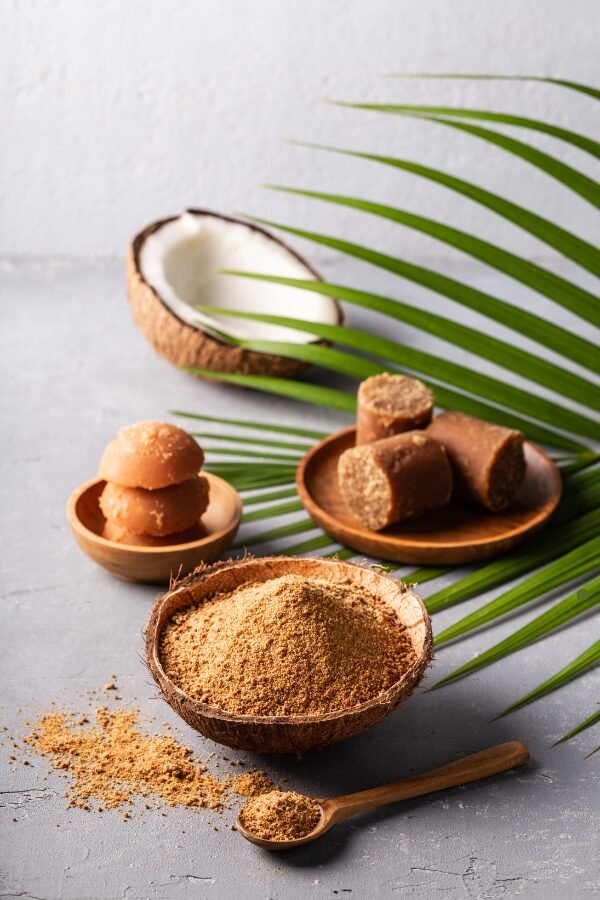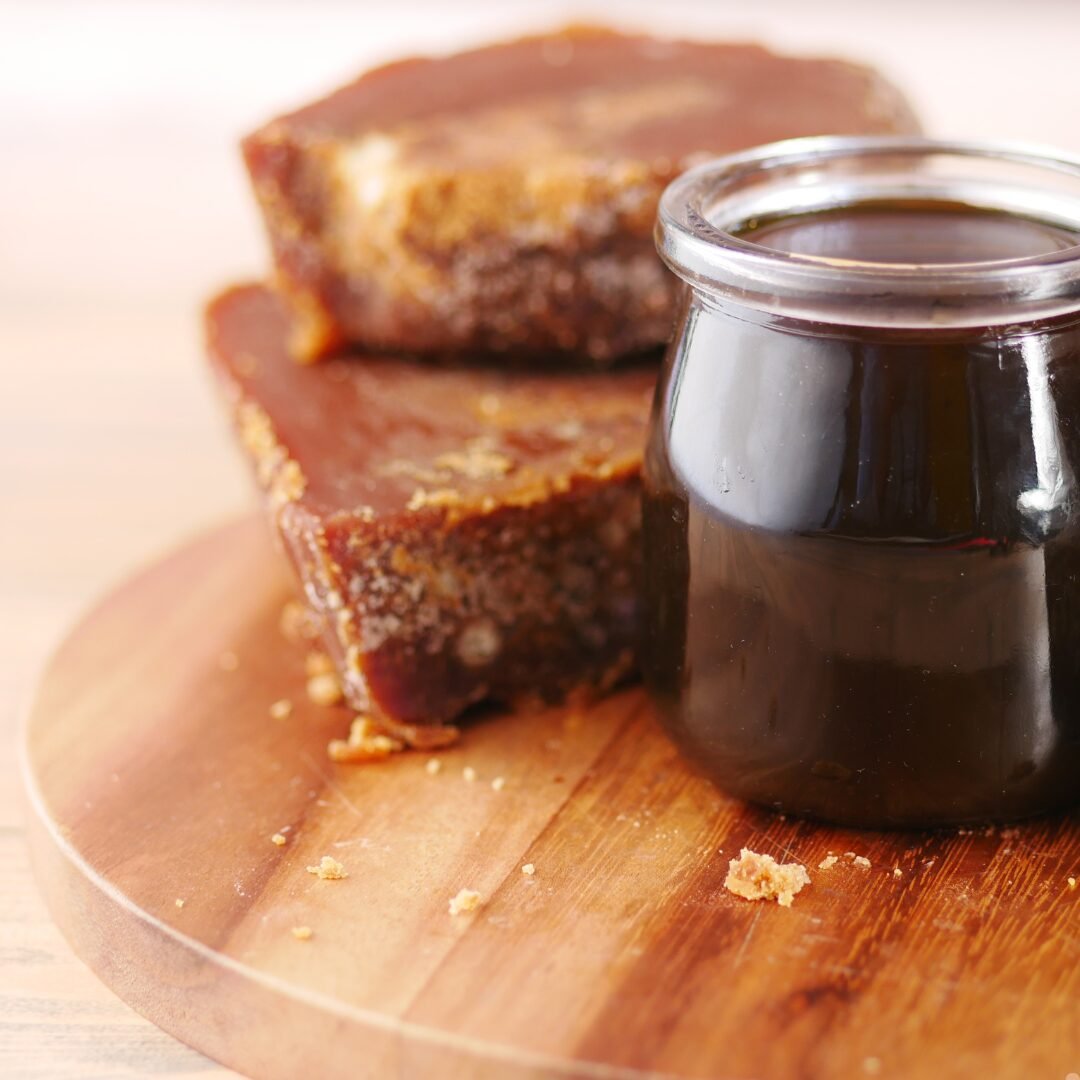How better is Jaggery than Sugar? Does it helps in your weight loss journey?
Do you frequently find yourself craving sweets while sticking to a diet? Do you feel anxious for not losing weight and regularly depriving yourself from your favourite food?
Well, the key to the problem solver is ‘Jaggery’ or most commonly ‘Gur’ in India! In recent years, there has been growing interest in alternatives to refined sugar, with one of the most prominent being Jaggery.
"
In this article, let us explore why Jaggery is a better alternative for health than sweet to maintain a diet and the cautions you should follow when consuming Jaggery.
How better is Jaggery than sugar?
Jaggery is an unrefined natural sweetener. Some people consider it a superfood because it has more vitamins and minerals and a lower sucrose content than sugar.
Moreover, Jaggery’s lower glycemic index (GI) compared to sugar is another reason for its appeal. This means it causes a slower and steadier rise in blood sugar levels, which can be beneficial for people maintaining diabetes or aiming to avoid energy spikes.
However, Jaggery isn't a guilt-free substitute!
While Jaggery offers advantages over Sugar, it’s essential to note that it’s still a concentrated source of calories and carbohydrates. Moreover, Overconsumption of Jaggery can lead to weight gain and other health issues associated with high sugar intake.
Additionally, some varieties of Jaggery may contain impurities, so sourcing it from reliable producers is crucial. The health benefits of Jaggery often lack strong scientific benefits. While some suggest potential benefits for digestion or blood pressure regulation, more research is needed.
Would you rather: Jaggery/Sugar?
Jaggery and sugar are both sweeteners, but they have different effects on health. Jaggery, also known as “gur” in India, is made from sugarcane juice or palm sap. It is a traditional sweetener used in many parts of the world.
Unlike refined sugar, which undergoes extensive processing, jaggery is less processed and retains more of the natural nutrients found in the source plant.
Here are several reasons why jaggery is considered a healthier option than sugar:
1. Provides Nutrition
Jaggery is rich in essential nutrients like iron, magnesium, potassium, and vitamins. These nutrients are largely stripped away during the sugar refining process. The presence of these nutrients in jaggery helps in maintaining good health and fulfilling dietary needs. Moreover it contains fewer calories, helps to lose weight.
Refined sugar, on the other hand, is known as “empty calories” because it provides calories without any significant nutrients. It lacks vitamins and minerals, making it a poor choice for those seeking to maintain a balanced diet.
2. Boosts Immunity
The minerals and antioxidants in jaggery help to boost the immune system. It contains zinc and selenium, which protect against free radicals and improve resistance to infections. Regular consumption of jaggery can help the body fight off common illnesses like colds and flu as well.
3. Helps in Digestion
Jaggery is known to aid digestion by stimulating the production of digestive enzymes. It also helps in regulating bowel movements and preventing constipation. In traditional medicine, jaggery is often recommended after meals to help digestion.
Jaggery can aid in preventing constipation and poor digestion, which can both contribute to weight gain.
4. Supports Detoxification
Jaggery acts as a natural detoxifier by helping to cleanse the liver by flushing out harmful toxins from the body. This detoxification process can improve overall health and prevent various health issues.
Excessive sugar consumption can lead to the accumulation of toxins in the body, which can also lead to various negative health effects over time.
5. Regulates Blood Pressure
The potassium and magnesium in jaggery help to maintain electrolyte balance in the body, which is essential for regulating blood pressure. This can be particularly beneficial for individuals with hypertension. Unlike refined sugar, jaggery is good for weight loss because it has a lower glycemic index.
6. Boosts Energy and Metabolism
Jaggery is a complex carbohydrate that provides a slow and steady release of energy. It is absorbed gradually by the body, preventing sudden spikes and drops in blood sugar levels. Potassium-rich jaggery is known to increase metabolism and aid in weight loss.
It helps in the energy conversion of carbs, which is necessary for calorie burning.
With a faster metabolism, your body becomes more efficient at burning calories, paving the way for quicker weight loss.


7. Extremely Beneficial to Skin
The antioxidants and minerals in jaggery help to maintain healthy skin by preventing oxidative stress and promoting the regeneration of healthy skin cells. It can help in reducing acne and other skin problems.
Excessive sugar intake can lead to inflammation and breakouts, and it can also accelerate the ageing process by damaging collagen and elastin, the proteins that keep skin firm and youthful.
8. Improves Bone Health
The calcium and phosphorus in jaggery contribute to stronger bones and teeth. It helps in maintaining bone density and preventing conditions like osteoporosis.
Refined sugar does not provide any nutrients that support bone health, and excessive consumption can actually deplete the body’s calcium reserves.
Jaggery: A Sweet Choice for Your Weight-loss Goals
Jaggery is a natural sweetener that can be used in place of refined sugar in various recipes. It satisfies sweet cravings without the negative health impacts of white sugar, aiding in weight management. Jaggery contains “zero fat”, making it a good choice for weight loss.
The potassium in jaggery helps reduce water retention and bloating, which can be beneficial for weight management.
How to Add Jaggery to Your Meals?
1. Sweeten Your Beverages
Replace refined sugar with jaggery in your tea, coffee, or homemade lemonade with a small piece of grated jaggery. The rich flavour profile of jaggery adds a subtle caramel note, hence enhancing your drink.
2. Spice Up Desserts
Jaggery can be a delightful substitute for sugar in baking. Use it in cookies, cakes, puddings, or kheer (rice pudding). Remember, jaggery might be slightly less sweet than sugar, so adjust the quantity accordingly.
3. Can Enhance Savoury Dishes as well
Jaggery adds a surprising depth of flavour to savoury dishes. Use it in stir-fries, marinades for grilled meats, or chutneys. A small amount can balance spice and add a touch of sweetness.
4. Serve As Energy Balls
Create healthy and delicious energy balls by combining jaggery powder with nuts, seeds, and dried fruits like dates or figs. They’re a perfect on-the-go snack.
5. A True Traditional Treat
Explore traditional Indian desserts that often use jaggery as a sweetener. Try recipes for laddus (sweetened balls made with flour or semolina), jalebis (deep-fried, pretzel-shaped treats), or barfi (dense fudge-like squares).
Cautions While Consuming Jaggery!
1. Moderation is Key
Remember, jaggery is still a form of sugar. While it offers some potential health benefits, excessive consumption can lead to weight gain and blood sugar issues. Stick to a moderate amount, ideally 20-30 grams (about 1-2 tablespoons) per day.
2. Source Matters
Opt for organic jaggery whenever possible. This ensures minimal processing and reduces the risk of impurities or contaminants.
3. Beware of Allergies
Jaggery might trigger allergies in some people, particularly those with sugarcane or pollen allergies. If you experience any discomfort after consuming jaggery, discontinue use and consult a doctor.
4. Diabetics Consult First!
While jaggery might have a slightly lower glycemic index than sugar, it can still affect blood sugar levels. Diabetics should consult their doctor before incorporating jaggery into their diet and monitor their blood sugar closely.
5. Summer Considerations
Jaggery might have a slight heating effect on the body. During hot summer months, some people prefer to limit jaggery intake or choose alternative sweeteners.
Final Thoughts
In a nutshell
"
Your body is less judgmental about your diets than your mind is
It’s important for you to maintain healthy diets and have an aspiration on losing weight. But, it’s necessary for you to be eternally happy too.
Jaggery can be a wonderful addition to your diet, offering a natural sweetness with a touch of essential minerals. As a natural sweetener, it is a healthier alternative to refined sugar and can help in weight management.By incorporating it in moderation and considering the cautions mentioned, you can enjoy the unique flavour profile of jaggery while potentially collecting some health benefits.



